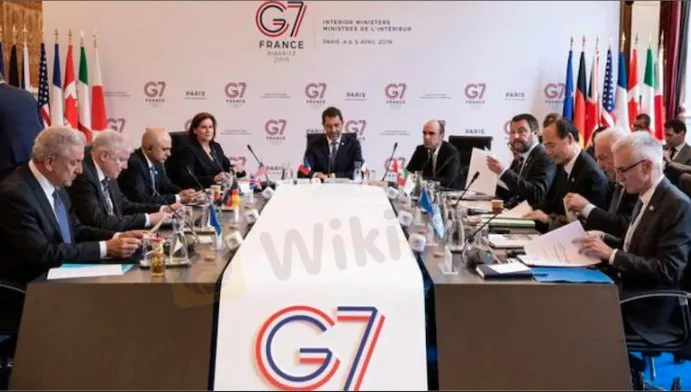简体中文
繁體中文
English
Pусский
日本語
ภาษาไทย
Tiếng Việt
Bahasa Indonesia
Español
हिन्दी
Filippiiniläinen
Français
Deutsch
Português
Türkçe
한국어
العربية
The G7 wants to get $600 billion to fight China's Belt and Road Initiative.
Abstract:SCHLOSS Group of Seven leaders met in Elmau, Germany, on Sunday, June 26. They promised to raise US$600 billion in private and public funds over the next five years to pay for infrastructure in developing countries that needs it and to compete with China's Belt and Road project, which has already cost many trillions of dollars.
Click Here: After you read it, Daily Routine with WikiFX
G7 leaders relaunched the “Partnership for Global Infrastructure and Investment” at their annual meeting in southern Germany.

Biden said the US would mobilize $200 billion in grants, federal cash, and private investment over five years to assist projects in low- and middle-income nations that combat climate change, promote global health, gender equity, and digital infrastructure.
“Clarify. This isn't charity. It will help countries to ”understand the tangible benefits of collaborating with democracies,“ Biden stated ”less
Biden said multilateral development banks, development finance organizations, sovereign wealth funds, and others might contribute billions more.
Europe will mobilize €300 billion over the same period to develop a sustainable alternative to China's Belt and Road Initiative, launched by President Xi Jinping in 2013.
Italy, Canada, and Japan also declared their plans. Emmanuel Macron and Boris Johnson weren't there, but their countries are participating.
China is investing in over 100 countries to create a contemporary Silk Road trade corridor from Asia to Europe.
White House officials say the initiative has benefited few poor nations.
G7 leaders attack Russian gold, oil pricing; Biden urges unity
Russia escalates missile attacks on Ukraine as G7 leaders meet.
Biden highlighted a $2 billion solar development project in Angola with funding from the Commerce Department, the US Export-Import Bank, US firm AfricaGlobal Schaffer, and US project developer Sun Africa.
Washington will pay US$3.3 million in technical assistance to Institut Pasteur de Dakar in Senegal as it constructs an industrial-scale adaptable multi-vaccine manufacturing facility that can produce COVID-19 and other vaccines.
USAID will donate $50 million over five years to the World Bank's Childcare Incentive Fund.
Friederike Roder, vice president of the non-profit Global Citizen, said the funding pledges might be “a promising start” toward greater G7 engagement in developing nations and support better global growth.
G7 countries give less than half of the 0.7% promised in development funding, she said.
Without developing countries, the international economy won't revive, she warned.
Disclaimer:
The views in this article only represent the author's personal views, and do not constitute investment advice on this platform. This platform does not guarantee the accuracy, completeness and timeliness of the information in the article, and will not be liable for any loss caused by the use of or reliance on the information in the article.
Read more

The Hidden Checklist: Five Unconventional Steps to Vet Your Broker
Forex broker scams continue to evolve, employing new tactics to appear credible and mislead unsuspecting traders. Identifying these fraudulent schemes requires vigilance and strategies beyond the usual advice. Here are five effective methods to help traders assess the legitimacy of a forex broker and avoid potential pitfalls.

Doo Financial Obtains Licenses in BVI and Cayman Islands
Doo Financial, a subsidiary of Singapore-based Doo Group, has expanded its regulatory footprint by securing new offshore licenses from the British Virgin Islands Financial Services Commission (BVI FSC) and the Cayman Islands Monetary Authority (CIMA).

CFI’s New Initiative Aims to Promote Transparency in Trading
A new programme has been launched by CFI to address the growing need for transparency and awareness in online trading. Named “Trading Transparency+: Empowering Awareness and Clarity in Trading,” the initiative seeks to combat misinformation and equip individuals with resources to evaluate whether trading aligns with their financial goals and circumstances.

Malaysian-Thai Fraud Syndicate Dismantled, Millions in Losses Reported
The Royal Malaysia Police (PDRM) has received 26 reports concerning the Nicshare and CommonApps investment schemes, both linked to a major fraudulent syndicate led by a Malaysian citizen. The syndicate’s activities came to light following the arrest of its leader by Thai authorities on 16 December.
WikiFX Broker
Latest News
ASIC Sues Binance Australia Derivatives for Misclassifying Retail Clients
Top 10 Trading Indicators Every Forex Trader Should Know
WikiFX Review: Is FxPro Reliable?
Malaysian-Thai Fraud Syndicate Dismantled, Millions in Losses Reported
Trading frauds topped the list of scams in India- Report Reveals
AIMS Broker Review
The Hidden Checklist: Five Unconventional Steps to Vet Your Broker
YAMARKETS' Jingle Bells Christmas Offer!
Revolut Leads UK Neobanks in the Digital Banking Revolution
Fusion Markets: Safe Choice or Scam to Avoid?
Currency Calculator


